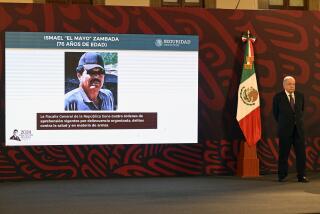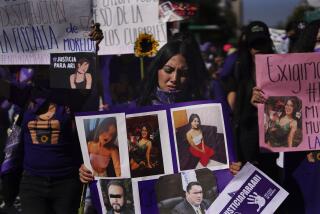Verdugo Trial Tactic Seen as Subterfuge
- Share via
Using unusually strong language, a top federal drug prosecutor Monday denounced the defense strategies of a man allegedly tied to the slaying of federal drug agent Enrique S. Camarena as possible “subterfuge by a powerful and dangerous narcotics cartel” to derail a U.S. investigation of Camarena’s death.
At a hearing in U.S. District Court in San Diego, Stephen G. Nelson, coordinator of the Southwest regional drug enforcement task force, told U.S. District Judge J. Lawrence Irving that the Justice Department probably will appeal any order requiring the government to produce the six Mexicans who turned accused drug smuggler Rene Martin Verdugo over to U.S. authorities last month at the Mexican border in Calexico.
Irving said last week that he was inclined to order the Mexicans--who have been granted safekeeping with their families in the United States because of threats to their lives in Mexico--to meet with him secretly to answer questions about their role in Verdugo’s forced departure from Mexico on Jan. 24. Howard Frank, Verdugo’s defense attorney, has argued that questioning the men is the only way to determine the truth of Verdugo’s claim that he was kidnaped.
But prosecutors have said that the safety of the witnesses, federal agents, Irving and court personnel could be jeopardized by such interviews. On Friday, they filed a secret document with Irving outlining the potential dangers, and, after the court hearing Monday, the usually circumspect Nelson underscored for reporters the gravity of the government’s concerns.
“This could be a subterfuge by a powerful and dangerous narcotics cartel to expose actual or potential government witnesses, which could conceivably compromise not only the existing case but an ongoing investigation,” he said.
Nelson confirmed that the government’s course in the Verdugo case was being directed by the office of Atty. Gen. Edwin Meese III in Washington. The matter is considered sensitive because Mexican authorities have been conducting their own investigation of Camarena’s kidnaping and slaying a year ago in Guadalajara--an investigation U.S. officials say has not been aggressive.
Nelson also confirmed for the first time that at least one federal grand jury was investigating the drug ring suspected of a role in the killing of the 37-year-old Drug Enforcement Administration agent and his Mexican pilot, Alfredo Zavala Avelar.
The Times reported earlier this month that Verdugo had been called to testify before a grand jury in Washington and that U.S. authorities had obtained a tape recording that convinced them Verdugo was present during Camarena’s torture.
“Given the magnitude of the investigation, what appears to be perfectly appropriate legal maneuvers could result in the unnecessary exposure of all the involved parties to harm and injury,” Nelson said. Because of the sophistication of the drug ring under investigation, security surrounding the proposed secret meeting between the Mexicans and Irving could be compromised, he explained.
Frank said Monday that the government’s security worries were groundless.
Verdugo claims he was abducted on the streets of San Felipe, Baja California, blindfolded, driven approximately 135 miles to the border and pushed through a fence into the hands of U.S. marshals. His attorneys say U.S. authorities paid $100,000 to the Mexicans, four of whom were Baja California State Judicial Police until last month, to abduct Verdugo. He is being held without bail on marijuana smuggling charges.
In court Monday, Irving directed Frank to contact another of his clients, convicted drug smuggler Victor Vidal, to determine whether Vidal believes Frank faces an ethical conflict by representing both him and Verdugo. Vidal, a protected government witness, is the key witness against Verdugo in the marijuana smuggling case and is a defendant in a $110-million civil rights lawsuit filed on Verdugo’s behalf last week.
Prosecutors want Frank removed as Verdugo’s attorney, but Frank and Verdugo say there is no conflict at the current stage of the proceedings.
More to Read
Sign up for Essential California
The most important California stories and recommendations in your inbox every morning.
You may occasionally receive promotional content from the Los Angeles Times.










